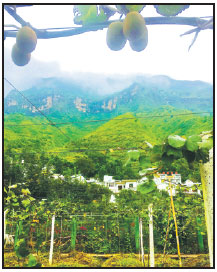
Guizhou has transformed its notoriously juddering terrain from a bane into a boon. Turns out, tricky geology can advance technology, Erik Nilsson discovers.
Editor's Note: This is Part 3 of the six-part Yangtze diaries series based on journalist Erik Nilsson's recent 35-day, 2,000-kilometer journey to 11 cities to discover how the Yangtze River Economic Belt has transformed over the 40 years since the reform and opening-up. Scan the code to watch the video.
I recently used an app to water a mountainside kiwi field in Guizhou's Shuicheng. A few taps on a phone and the taps of the sprinkler systems started spurting.
|
A bird's-eye view of Chishui River, Guizhou province. Photos by China Daily New Media Center |
It was one of several experiences that showed me how topographically treacherous Guizhou - one of China's poorest provinces for time immemorial - is turning its geological disadvantages into technological advantages.
Turns out, big data has climate preferences - cool and stable - and is averse to seismic twitchiness.
And Guizhou's karsts, which have long stood as obstacles to its development, sire ideal conditions for data storage.
Much of this is concentrated around the capital, Guiyang - aka, the "city of eternal spring". The city has an average temperature of 22 C and rarely registers anything beyond magnitude-3 tremors.
So, China selected Guizhou as the site of the country's first comprehensive big data experimental zone.
Big data has contributed over 20 percent of Guizhou's annual growth from 2014 to the end of 2017.
I visited a park with 29 buildings that house 60,000 cabinets and 800,000 servers. It hosts data centers for such telecom giants as China Telecom, China Mobile and China Unicom. Huawei's data center is under construction.

The porous, melted-limestone landscapes are pocked with a honeycomb of caves particularly ideal for data hardware.
One of the centers is contained in a man-made tunnel connecting two mountains. Its natural ventilation saves energy, my guide told me.
The park includes a district in which the province has concentrated its major universities to cultivate talent for the industry.
It's also producing the semiconductors used to store and process big data - "like the neurons in a giant brain", as one producer put it.
Thus, Guizhou's otherwise-hazardous topography has led to an explosion of big data's development in the province and throughout the country.
The app I used at the 400-hectare agricultural-technology-demonstration park built in Shuicheng six years ago operates according to a big data system adopted last year.
Sensors monitor such conditions as sunlight, moisture, nutrition, temperature and pests, and relay the information to the app.
The app can perform such actions as watering and fertilizing fields according to the data. This reduces human labor - and error.
"It requires electricity", agronomist Zhang Rongquan told me, "which comes from that", he said, pointing to a waterfall blasting down a mountainside.
The cascade gushed into a fizzing pool in front of a two-story statue of a kiwifruit slice installed for photo ops.
At the bottom of the alp's water ribbon, teeny people got out of tiny cars to snap shots with the huge fruit wedge.
The fruit from which the kiwi was created in New Zealand originally came from China's Sichuan province over a century ago.
The wild varieties, then called Chinese gooseberries, were grape-sized and bitter.
They were selectively bred in New Zealand to create the large, sweet varieties we eat today.
About a decade ago, I reported on how the not-so-prodigal kiwi had returned home to southwestern China's soil.
It's today cultivating new prosperity in places like Shuicheng.
The variety that thrives in Guizhou - relatively bald and with a tangyhoney aftertaste - sells for four to 10 times more than Sichuan's on average, locals told me.
Turns out, like big data, they thrive in climatically stable karsts.

Guizhou has long been known for poor soil that often produces little more than low-grade corn on terraces chopped into the mountains over centuries.
"Local farmers could only earn about 1,000 yuan ($144) per mu (1/15th of a hectare) growing corn," Zhang told me atop the mountain that the orchard spills down.
"They earn an average of 30,000 yuan per mu a year growing kiwifruit. They can earn 90,000 yuan per mu at most."
I pointed out a small cornfield below, at the orchard's edge.
"That'll be gone next year," Zhang told me.
"Locals have realized kiwifruit brings in several times more money."
Shuicheng's kiwis are not only eaten raw but also processed into alcohols and soft drinks with growing national brand recognition.
Many residents lease their land to growers and earn about 100 yuan additionally a day as migrant workers, he explains.
Others are capitalizing on the growing tourism industry, as more outsiders arrive to pick fruit and enjoy the striking scenery.
The number of visitors to the agricultural park and surrounding area has grown from roughly 20,000 six years ago to about 80,000 today. Villas built in the scenic spot cost about 2,000 yuan a night.
Guizhou was the last stop of my 35-day, 2,000-kilometer journey to 11 destinations along the Yangtze to discover how cities on the river have embraced the achievements and confronted the challenges brought by the reform and opening-up.
China is addressing such problems as uncoordinated regional development, widening wealth gaps and environmental degradation by shifting toward new models that focus on quality development rather than growth for growth's sake.
The country is improving people's lives while protecting the ecosystems we depend on.
The reform and opening-up is still unfolding, especially as China enters a new era.
It's not only a model for development along the waterway - or even throughout China - but, ultimately, an inspiration for the world we all share.
Contact the writer at erik_nilsson@chinadaily.com.cn
(China Daily 12/29/2018 page20)